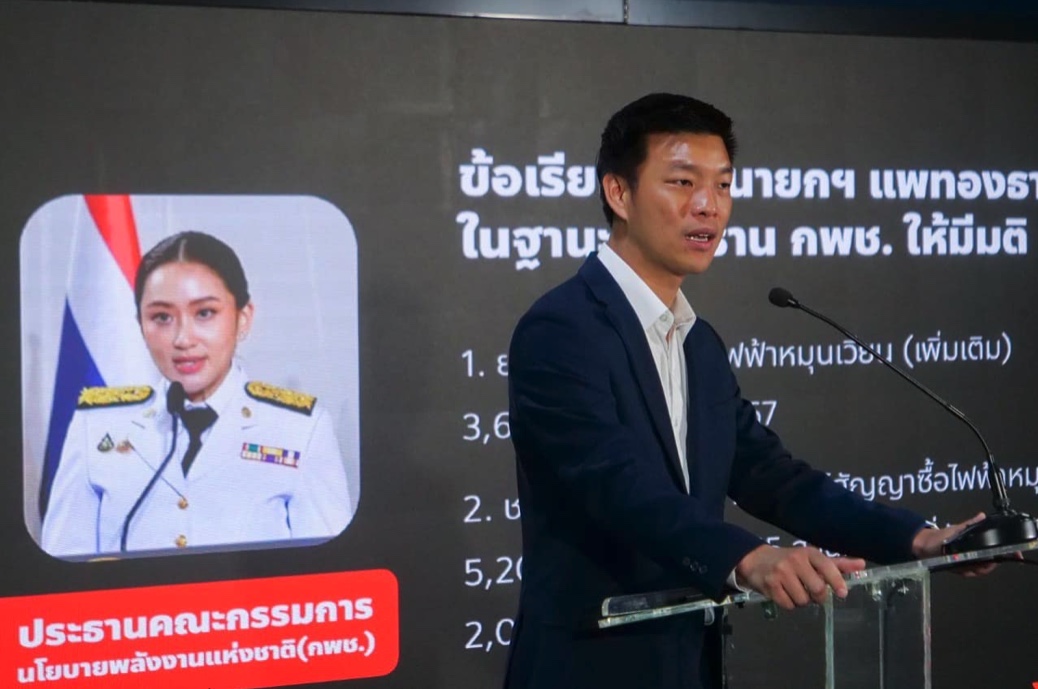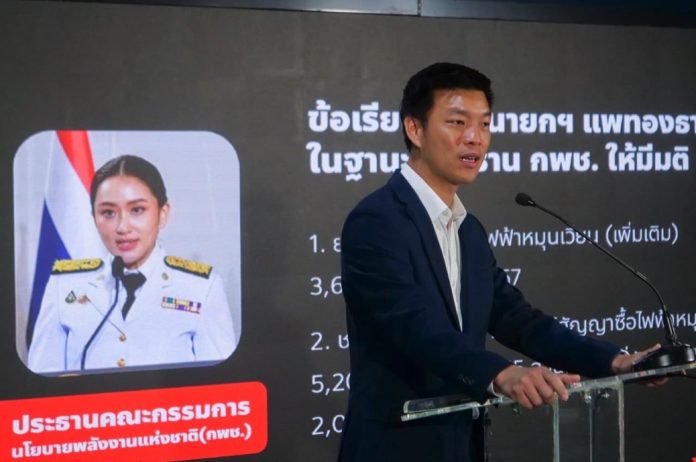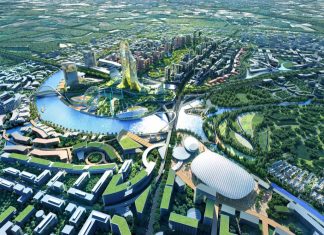จากกรณีโครงการรับซื้อไฟฟ้าพลังงานหมุนเวียน 3,600 เมกะวัตต์ ที่พรรคประชาชนได้ตั้งข้อสงสัยมาตลอดว่าเป็นการเอื้อประโยชน์ให้กลุ่มทุนพลังงานแลกกับค่าไฟแพงขึ้นที่ประชาชนต้องควักกระเป๋าจ่ายหรือไม่ จนนำไปสู่การตั้งกระทู้ถามในสภาถึงสองครั้ง ครั้งหนึ่งเมื่อวันที่ 24 ตุลาคม 2567 และอีกครั้งเมื่อวานนี้ 19 ธันวาคม 2567 ซึ่งปรากฏว่ารัฐบาลไม่ได้ส่งใครมาตอบกระทู้เรื่องนี้เลย
สถานการณ์ล่าสุดในเวลานี้ คณะกรรมการกำกับกิจการพลังงาน (กกพ.) เมื่อวันที่ 16 ธันวาคม ที่ผ่านมา ได้ประกาศผลการคัดเลือกผู้ชนะที่จะได้สัมปทานไปเรียบร้อยแล้ว และให้มาเซ็นสัญญาซื้อขายไฟฟ้าภายใน 14 วัน นั่นเท่ากับโครงการนี้กำลังจะเดินหน้าผ่านฉลุย ถ้าไม่มีการระงับยับยั้งใด ๆ ภายในวันที่ 30 ธันวาคม 2567
และผู้ที่มีอำนาจยับยั้งนี้ ก็คือนายกรัฐมนตรี ซึ่งมีฐานะเป็นประธานคณะกรรมการนโยบายพลังงานแห่งชาติ (กพช.) แต่คำถามคือเหตุใดนายกรัฐมนตรีจึงไม่ได้ทำอะไรกับเรื่องนี้ ทั้งที่โครงการดังกล่าวเป็นที่ชัดเจนว่ามีความไม่ชอบมาพากล
นั่นคือประเด็นที่ ณัฐพงษ์ เรืองปัญญาวุฒิ หัวหน้าพรรคประชาชน ได้ตั้งข้อสังเกตในการถามกระทู้นายกรัฐมนตรี ซึ่งไม่ได้ปรากฏตัวในสภามาตอบคำถามเรื่องนี้เมื่อวานนี้
ล่าสุด รองเลขาธิการพรรคเพื่อไทยคนหนึ่ง ออกมาชี้แจงว่านายกรัฐมนตรีได้สั่งทบทวนมติในเรื่องนี้ไปแล้ว และข้อกล่าวหาของหัวหน้าพรรคประชาชนไม่เป็นความจริง นายกรัฐมนตรีไม่ได้นิ่งนอนใจ นายกรัฐมนตรีสั่งให้ทบทวนเรื่องนี้ตั้งแต่เข้ามาดำรงตำแหน่งแล้ว ฯลฯ
อย่างไรก็ตาม ถ้าเรากางไทม์ไลน์เรื่องนี้แบบครบถ้วนกระบวนความจริง ๆ จะเห็นได้ชัดเจนว่านายกรัฐมนตรีใส่ใจและรับผิดชอบกับเรื่องนี้จริง ๆ หรือไม่?
-
24 ตุลาคม 2567 – ในการตั้งกระทู้ครั้งแรกของณัฐพงษ์ รัฐมนตรีว่าการกระทรวงพลังงาน พีระพันธุ์ สาลีรัฐวิภาค ได้มาตอบกระทู้แทนนายกรัฐมนตรี โดยยอมรับว่าโครงการดังกล่าวมีปัญหาจริง ควรมีการเปิดประมูล และการล็อกโควตาอาจจะผิดกฎหมายได้ และได้สั่งให้มีการทบทวนไปแล้ว
-
14 พฤศจิกายน 2567 – รัฐมนตรีว่าการกระทรวงพลังงาน ได้ส่งหนังสือถึง กกพ. ขอให้ระงับโครงการรับซื้อไฟฟ้า 3,600 MW ไว้ก่อน
-
26 พฤศจิกายน 2567 – ในการประชุม กพช. ที่นายกรัฐมนตรีเป็นประธาน ได้มีการสั่งให้ทุกหน่วยงานที่มีโครงการพลังงานสะอาด “เดินหน้าทุกโครงการ”
-
16 ธันวาคม 2567 – กกพ. ประกาศชื่อเอกชนที่ได้รับการคัดเลือก และกำหนดให้มีการลงนามสัญญาซื้อขายไฟฟ้าภายใน 14 วัน (เท่ากับเมินความเห็นของ รมว.พลังงาน)
-
19 ธันวาคม 2567 – ณัฐพงษ์ตั้งกระทู้สดถามนายกฯ ถึงกรณีการรับซื้อไฟฟ้านี้อีกครั้ง แต่ไม่ได้รับคำตอบใด ๆ ไม่มีใครมาตอบกระทู้
ตั้งแต่วันที่ 24 ตุลาคม 2567 ที่มีการตั้งกระทู้และตอบกระทู้ของรัฐมนตรีว่าการกระทรวงพลังงาน ตลอดจนมีการทำตามคำมั่นโดยรัฐมนตรีว่าการกระทรวงพลังงานที่ยอมรับว่าโครงการนี้มีปัญหาจริง ๆ
นายกรัฐมนตรีย่อมรับรู้ได้ถึงปัญหาของโครงการดังกล่าว และสามารถใช้อำนาจของ กพช. ที่ตัวเองเป็นประธาน เพื่อระงับยับยั้งโครงการได้
แต่การประชุม กพช. ในวันที่ 26 พฤศจิกายน 2567 นายกรัฐมนตรีกลับไม่มีการสั่งการใด ๆ ในเรื่องนี้ จนล่วงเลยมาถึงวันที่ 16 ธันวาคม 2567 กพพ. ก็ได้ประกาศผลผู้ชนะที่ได้สัมปทาน
ถ้านายกฯ “ใส่ใจ” และ “ดำเนินการตามหน้าที่อย่างเต็มความสามารถ” อย่างที่รองเลขาธิการพรรคเพื่อไทยคนดังกล่าวอ้าง ทำไมการประชุมในวันที่ 26 พฤศจิกายน 2567 ซึ่งผ่านไปเกือบหนึ่งเดือนหลังมีการท้วงติงจากทั้งพรรคประชาชน และจากรัฐมนตรีว่าการกระทรวงพลังงานเอง นายกรัฐมนตรีถึงไม่ใช้อำนาจที่ตัวเองมีในฐานะประธาน กพช. สั่งการเรื่องนี้?
คำตอบมีเพียงสามประการ คือ 1) นายกรัฐมนตรีไม่ใส่ใจ 2) นายกรัฐมนตรีไม่รู้เรื่อง
หรือ 3) นายกรัฐมนตรีรู้เรื่องดี ทราบว่าผลของการปล่อยให้การรับซื้อไฟฟ้านี้เกิดขึ้น จะกระทบประชาชนแค่ไหน แต่ก็จะปล่อยให้เป็นแบบนี้ จะด้วยเหตุผลใดนั้น คงมีแต่ตัวนายกรัฐมนตรีเองที่ทราบดีอยู่แก่ใจ
ไม่ว่าคนจากรัฐบาลหรือพรรคเพื่อไทยจะพูดอย่างไร ข้อเท็จจริงที่ว่าในวันที่ 26 พฤศจิกายน 2567 ที่นายกรัฐมนตรีนั่งอยู่ตรงนั้นในที่ประชุม กพช. พร้อมอำนาจที่ตัวเองมีในมือ แต่กลับไม่ทำอะไรทั้งนั้น ก็คือข้อเท็จจริงที่ปฏิเสธไม่ได้
และการกระทำเช่นนั้นเอง คือสิ่งที่นำพาพวกเรามาถึงสถานการณ์ที่หากนับถอยหลังอีกเพียง 10 วันแล้วยังไม่เกิดอะไรขึ้น เราจะไม่สามารถระงับโครงการที่มีปัญหานี้ได้ คนไทยและธุรกิจไทยต้องรับภาระค่าไฟที่แพงกว่าเดิมไปอีก 25 ปี
ภายใน 30 ธ.ค. หากนายกไม่หยุดยั้งสัญญารับซื้อไฟฟ้าเอื้อทุนพลังงาน คนไทยต้องจ่ายค่าไฟแพงไปอีก 25 ปี
โดย วรภพ วิริยะโรจน์ และพรรคประชาชน (People’s Party)
Thai PM Faces Pressure to Halt 3,600 MW Electricity Deal Amid Rising Cost Concerns

The purchase of 3,600 MW of electricity will lead to higher electricity costs than necessary, and the Prime Minister is the only one who can halt or proceed with this process that could result in expensive electricity bills.
The renewable energy procurement project for 3,600 MW has long been under scrutiny by the People’s Party, which has raised concerns about whether the project benefits energy conglomerates at the expense of the public, who would have to shoulder increased electricity costs. This issue led to two parliamentary inquiries, the first on October 24, 2024, and the second on December 19, 2024. Notably, the government failed to send any representatives to address these questions.
The latest development occurred on December 16, 2024, when the Energy Regulatory Commission (ERC) announced the winners of the project’s concession and required them to sign power purchase agreements within 14 days. This means the project is set to proceed unless it is halted before December 30, 2024.
The Prime Minister, as the chair of the National Energy Policy Council (NEPC), has the authority to suspend the project. However, questions have been raised about why the Prime Minister has taken no action on this matter, even though there are evident irregularities associated with the project.
Natthaphong Ruengpanyawut, leader of the People’s Party, highlighted this issue during yesterday’s parliamentary inquiry. Once again, the Prime Minister failed to appear in parliament to provide answers.
In response, a deputy secretary-general of the Pheu Thai Party claimed that the Prime Minister had already ordered a review of the project and dismissed the allegations as untrue. The deputy insisted that the Prime Minister had been proactive in addressing this issue since taking office.
However, a detailed timeline reveals a different story regarding the Prime Minister’s involvement and responsibility:
-
October 24, 2024: During the first parliamentary inquiry, Energy Minister Peerapan Saleeratthavipak admitted that the project had problems, suggesting it should undergo a competitive bidding process and acknowledging potential legal issues with quota allocations. He claimed to have ordered a review.
-
November 14, 2024: The Energy Minister sent a letter to the ERC requesting a suspension of the 3,600 MW procurement project.
-
November 26, 2024: During an NEPC meeting chaired by the Prime Minister, a directive was issued for all clean energy projects to proceed without delay.
-
December 16, 2024: The ERC announced the winning bidders and set a 14-day deadline for signing contracts, disregarding the Energy Minister’s earlier recommendations.
-
December 19, 2024: Natthaphong raised the issue again during a live parliamentary session, but no response was provided.
Since October 24, 2024, when the project’s issues were first discussed in parliament, the Prime Minister should have been aware of the problems and could have exercised her authority as NEPC chair to halt the project. However, no such action was taken during the November 26, 2024, NEPC meeting, and the project continued until the ERC announced the winning bidders on December 16, 2024.
If the Prime Minister was truly attentive and fully committed to fulfilling her responsibilities, as claimed by the Pheu Thai Party deputy, why did he fail to take decisive action during the November 26, 2024, NEPC meeting, which took place nearly a month after concerns were raised by both the People’s Party and the Energy Minister?
There are only three possible explanations. The Prime Minister was either not paying attention, unaware of the issue, or fully aware of the consequences but chose to allow the project to proceed for reasons known only to him.
Regardless of what government officials or Pheu Thai Party representatives might claim, the fact remains that on November 26, 2024, the Prime Minister had the authority to intervene during the NEPC meeting but chose not to act. This decision, or lack of action, has led to the current situation. If no action is taken within the next ten days, it will be impossible to halt this problematic project. As a result, Thai citizens and businesses will face higher electricity costs for the next 25 years.
By December 30, 2024, if the Prime Minister does not stop the power purchase agreement that favors energy conglomerates, Thai people will be burdened with exorbitant electricity bills for the next 25 years.
By Woraphop Viriyaroj and People’s Party












